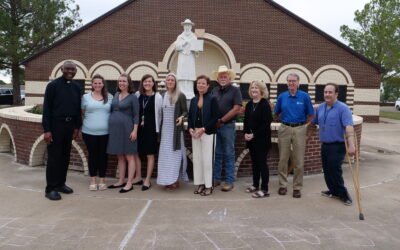The Courage of an American Pastor
Being the pastor of a parish requires courage, but the nature of that courage is going to differ depending on where that parish is in the world.
In many parts of the Middle East, Africa and Asia, courage is a stark matter of risking death to celebrate Mass and to stand up with your flock. This is the courage of the martyrs, willing to shed blood just for wearing a collar and saying ‘yes’ to the question, “Are you a follower of Jesus?” May God give these pastors the strength and protection they need to have that courage.
In other places, including certain parts of the United States, it takes courage for a pastor to publicly adhere to the teachings of the Bible and the Church. Pastors today run the risk of being slandered, mocked, shunned, and even persecuted by those who believe that Jesus is not only irrelevant, but offensive. May God give them the strength and protection they need to have that courage.
But there is another kind of courage that a pastor must have daily that is often overlooked and unappreciated, one that seems almost insignificant compared to the examples above. It is the courage a pastor must have to lead the men and women who work and worship in his parish. What does this kind of courage look like, and what is the cost that a pastor must be willing to bear?
For some, it is simply the courage to sit down with an associate priest who may not be preparing adequately for his homilies, to help him come to terms with his shortcomings as a preacher and to find the help he needs. Ouch. No one looks forward to that intervention. The fact is, it takes courage.
Some might say, “Courage? What does a pastor have to fear from that conversation? He isn’t going to get stoned to death or arrested or spit upon. What is he afraid of?” For many pastors, it is the fear of his associate being upset with him, or of the awkwardness of that moment when the associate might be defensive, or hurt. Is that a good reason for a pastor not to have that conversation? No. Is it a legitimate fear? Yes. What is the solution? Courage. Trust in God. Pure intentions. And selfless love.
How about another situation that requires courage from a pastor? A ministry is not growing, is not excellent, and is not bringing people to Christ. The people who lead the ministry are proud of it, and their identities are wrapped up in it. The ministry is taking up time, energy and resources in the parish, resources that could be better used in more fruitful, excellent ministries. It takes courage for a pastor to sit down and have a difficult conversation with the people who lead that ministry, to enter the danger with them about the situation, and to exhort them to be willing to make changes. Avoiding the issue is certainly not an act of courage, or love, for that matter.
Courage usually requires sitting down with someone, face to face, and loving them enough to tell them the truth. There is no guarantee that it will go well, but there is a guarantee that it will be uncomfortable. Which is probably why so many leaders, pastors included, avoid those situations. But that is a guarantee that nothing will change. Change requires courage. And trust in God.
One more example? A pastor knows that his staff members are afraid to challenge him because he has been ill-tempered about their concerns or suggestions in the past. He has heard indirect complaints about it. And he can tell that people are uneasy with him, just by being with them during a meeting. It takes courage for that pastor to sit down with them and admit that he needs to change, and that he wants to listen to and act upon the good ideas of the people he works with. What is he afraid of? Awkwardness and discomfort. That is understandable. It will certainly be a little awkward and uncomfortable. But with courage, it will also be liberating, for him and for everyone else. And it will help his parish.
I can’t believe I’m about to write this, but sometimes I think some pastors would prefer to demonstrate their courage in bold, obvious ways than in private, interpersonal matters. It is one thing to have a person yell at you for being a follower of Jesus and for standing up for what He teaches us. But it is something different to have a colleague well up with tears when they are confronted with a reality that is hard to hear. I understand this. I do. But the cost of not having interpersonal courage is too great in a world that needs vibrant, thriving parishes.
May God give all pastors the strength and protection they need to have whatever kind of courage their world is calling them to have.

Pat Lencioni | Co-founder
The Amazing Parish




Telling the truth in love, yes. And telling the truth in a way that the other person can hear it. There’s no point in telling the truth if the other person feels assaulted or demeaned.
Thank you for your ministry. As a parish worker it’s exciting to have these resources and they couldn’t be hitting at a better time. God reminds us in dark times, mercy will abound. You are part of that mercy, thank you.
Thank you for the thought on Courage for the Pastor. I am faced with such a situation with my staff in my new assignment.
Sometimes, the courage it takes to do “heroic” acts for the sake of the Gospel seems easier compared to the daily need to be courageous in facing difficult conversations that do not only feel awkward but hurting – because of the thought that I am hurting another person’s feeling. But the truth does sometimes hurt. May God strengthen me in times like this.